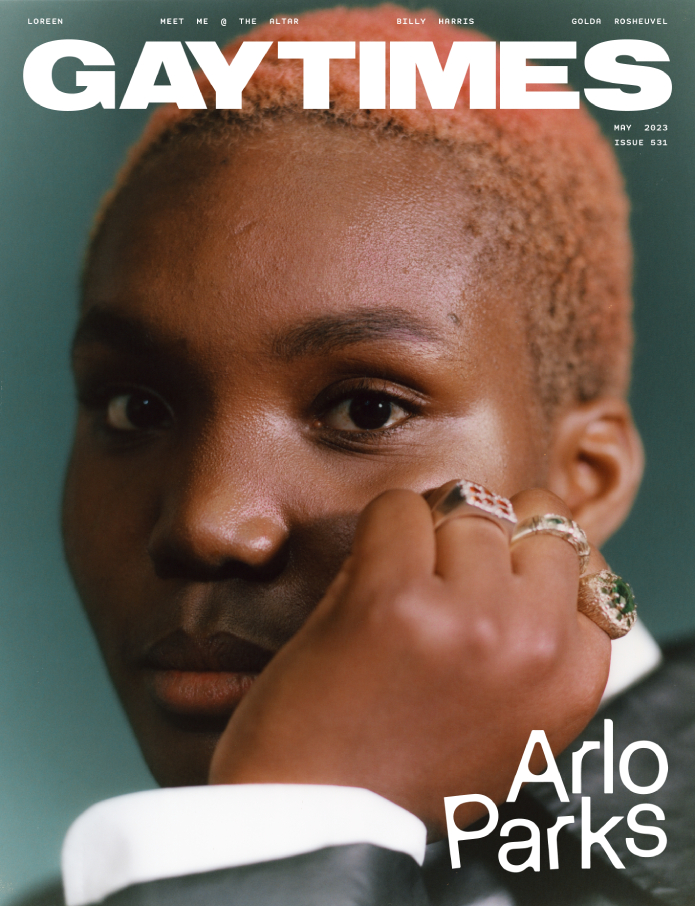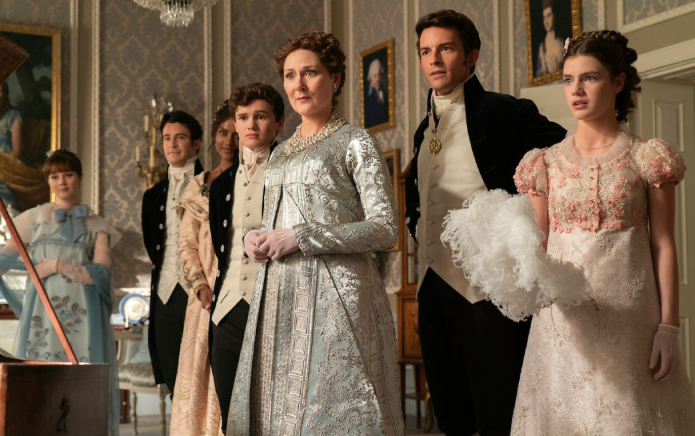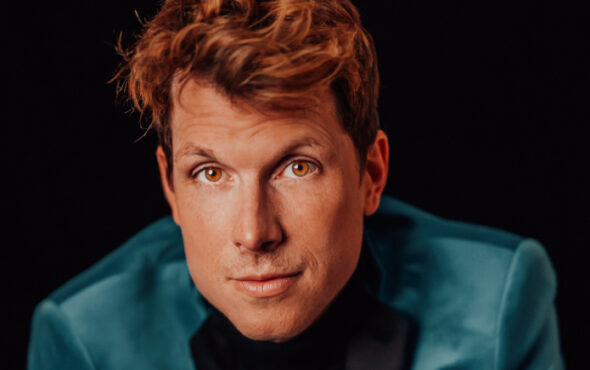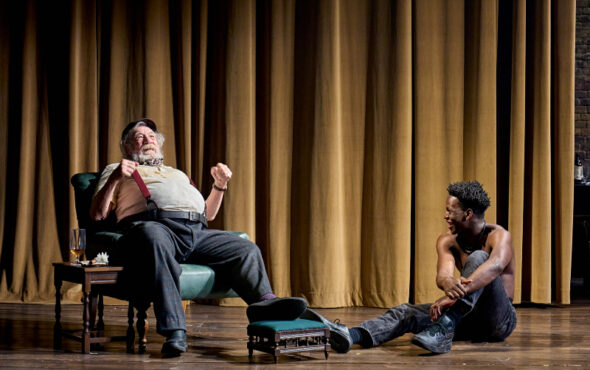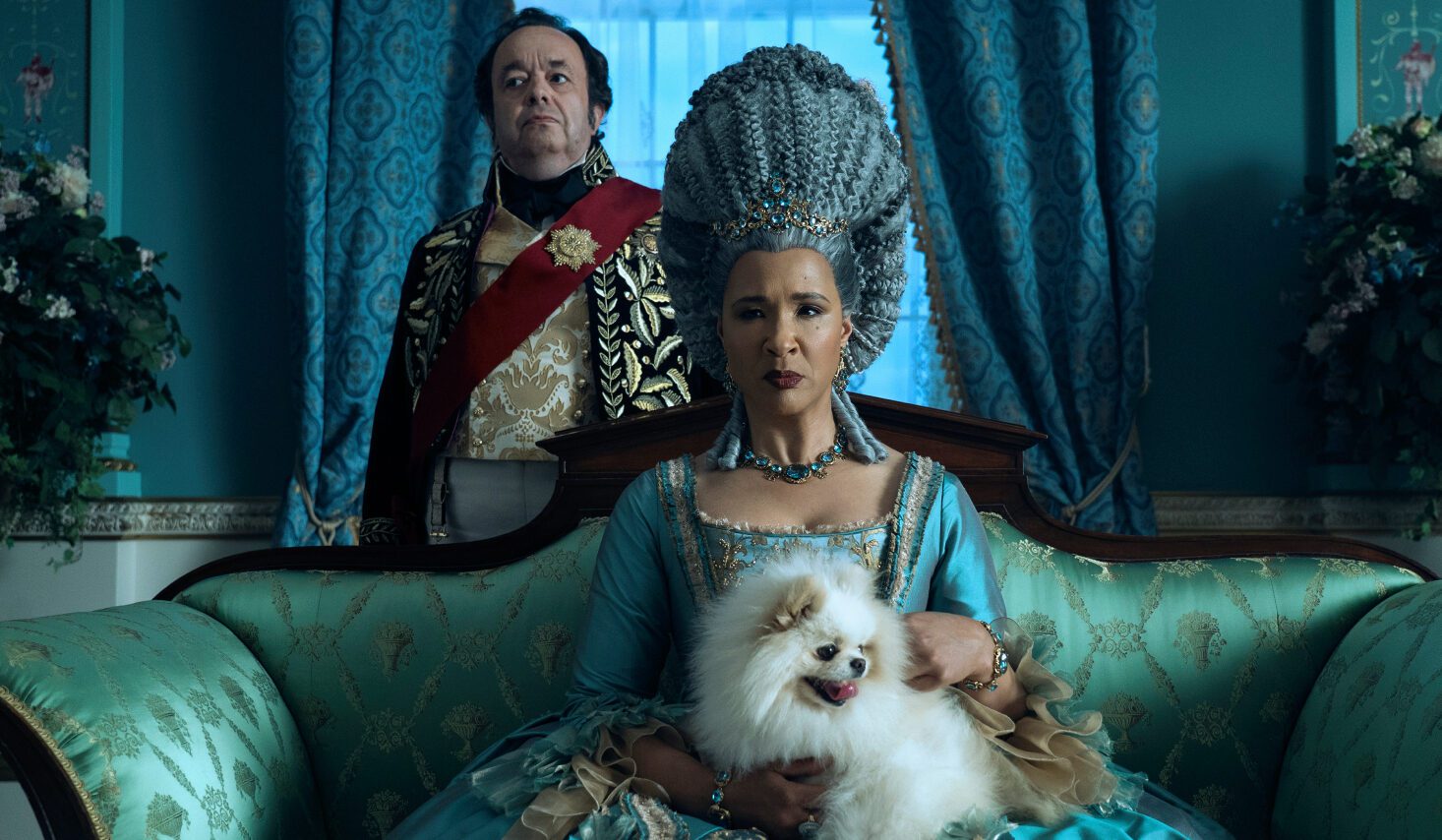
“It is a beautiful thing when you see a young person of colour aged five or six dressing up as Queen Charlotte for Halloween or a birthday party,” says Golda Rosheuvel, who made her mainstream breakthrough in 2020 for her portrayal of Bridgerton’s swanky monarch. Since its premiere, Netflix’s witty – and campy, we should add campy – period drama has been lauded for depicting a racially integrated regency-era London, with a plethora of central characters played by actors of colour. This classic “colour-blind” approach from Grey’s Anatomy creator Shonda Rimes continues with the upcoming limited prequel series, Queen Charlotte: A Bridgerton Story, which sees rising star India Amarteifio take on the spunky and commanding qualities that made Rosheuvel’s title character such a fabulous force of nature.
“I don’t own this role,” Rosheuvel, who is best known for her extensive work in theatre (she memorably played a lesbian version of Othello), tells GAY TIMES. “I like sharing and I think that’s really important especially with younger artists to pave the way and create a platform for them to have a voice. It’s such a unique and brilliant position that both India and I are in to be able to share this role and this time together and to walk hand-in-hand and advocate for this character.”
Premiering 4 May on Netflix, the six-episode series centres on Young Queen Charlotte’s rise to prominence and how her turbulent marriage to King George (Corey Mylchreest) sparked a societal shift. Here, Golda Rosheuvel speaks with GAY TIMES about the forthcoming series, the franchise’s “wonderful” impact on POC audiences and Queen Charlotte’s unsung status as Bridgerton’s Next/First Drag Superstar.
First of all, why do you think Queen Charlotte’s story is deserving of the prequel treatment?
She’s a fan favourite. It’s very humbling when you put your work out there and it comes back so positively. I think even from Shonda Rimes and Ted [Sarandos] at Netflix… it was actually Ted’s mother-in-law that pushed the idea a little bit and wanted to know more about her. Ted and Shonda got in touch and, yeah, it’s been a humbling experience but really thrilling as well.
I honestly worship Shonda.
I know! She’s great isn’t she? She’s very clever at what she does and I think the other thing as well is, because her characters are so relatable, you can access them. She writes very human and she does that for Charlotte as well, this regal, powerful, matriarch. I would sit down next to Charlotte and watch a boxset, do you know what I mean? Because you can relate to her. That’s all in the writing. She knows who she is and she’s very sure of herself. She’s unapologetic and I think that seeps through right from the beginning and I think India’s placed it really well with her Queen Charlotte. She’s beautifully placed the wit, the surety, the unapologetic and standing firm in her femininity and womanhood. She’s got it.
Because of all those qualities, everything queer people are especially drawn to, Queen Charlotte has a huge LGBTQ+ following. She’s always a meme/gif on social media. Are you aware of that?
Yes! I am aware. That’s really cool as far as I’m concerned being a queer woman. That’s great.
India is absolutely brilliant in this role. She retains that spunky and icy nature of Queen Charlotte. What did the relationship between you and India look like beforehand? Did you get the chance to give her any pointers?
We had a really beautiful afternoon together. We had a walk and a chat and I was really an advocate for her to take the role and make it her own. I don’t own this role. I like sharing and I think that’s really important – especially with younger artists to pave the way and create a platform for them to have a voice. It’s such a unique and brilliant position that both India and I are in to be able to share this role and this time together and to walk hand-in-hand and advocate for this character. It’s great. My only advice was, ‘Take it babe. Fly and make it your own.’
Bridgerton has been praised for depicting a regency-era London in which white people and people of colour are equal. What impact have you noticed this have on viewers at home, particularly those who are POC?
It is a beautiful thing when you see a young person of colour aged five or six dressing up as Queen Charlotte for Halloween or a birthday party. It is a wonderful thing when a woman who is not of colour comes up to you and says, ‘I did a Bridgerton-themed wedding and a friend of mine came dressed as Queen Charlotte.’ I am so proud of that. These shows – and I include Queen Charlotte in this – are speaking to a wider audience and they are finding those characters for themselves, placing those characters in their own lives, running with them and creating their own journeys and stories. That’s how things move forward. That’s how we as storytellers can talk about difficult subjects: race, sexuality, representation and inclusion. Our platform as storytellers is the perfect place, in my opinion, to discuss those subjects through characters like Queen Charlotte so that it’s accessible to people, so people can discuss something without realising they’re discussing something.
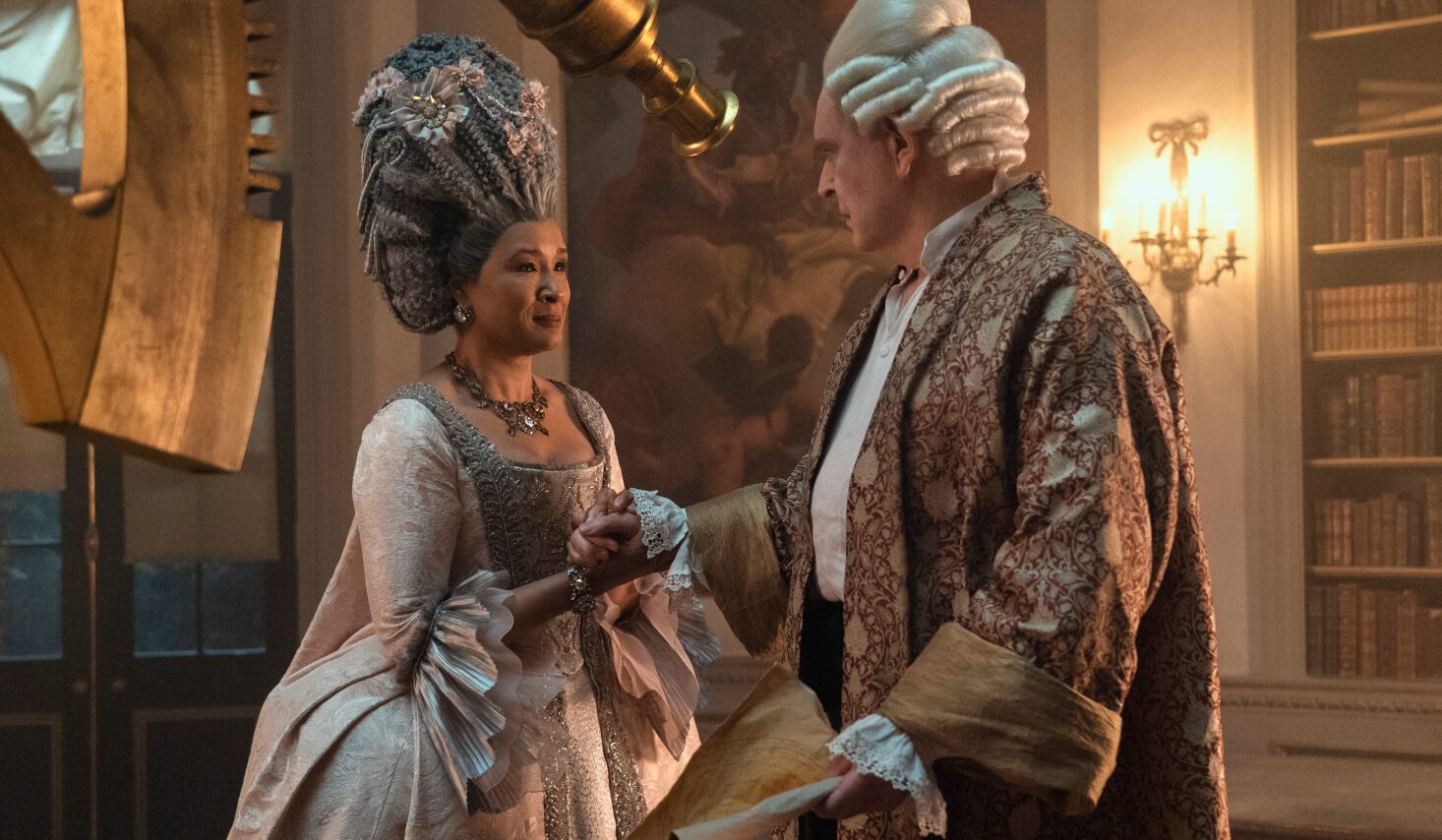
We’re in dire need of more media without trauma elements.
We’re just there loving life, being sad, happy, joyful, sexy, laughing, crying, wearing beautiful clothes and having amazing wigs on our heads. We’re all in it together. It’s great. And we’re messy as well, human beings are messy. It doesn’t matter what colour they are or religion, gender and sexuality. We are all complex human beings and that is celebrated in Bridgerton and Queen Charlotte.
As LGBTQ+ storylines are still often based in trauma and shame, would you like the Bridgerton Universe to take a similar approach to LGBTQ+ issues if it does explore them more deeply in the future?
Why not? Again, with what we do, there’s room to discuss everything and not explain it, for it to just be a relationship that is in whatever it is in. Do you know what I mean? Happiness, lust, anger, anguish, whatever that may be. We are in a really great position to be able to do that and we shouldn’t be afraid of it. There are some really wonderful and brilliant stories out there to be told of the LGBTQ+ community. Let’s just tell them.
In Bridgeton and this prequel, you are essentially in drag…
[Laughs] Yes! I am. I am. I have never thought about it like that. That’s cool. I like that. Marvellous.
What power do you feel when you’re in Queen Charlotte’s glorious getup?
That’s an interesting one. It’s definitely a layer of character, 100%, because it changes the way I, Golda Rosheuvel, move. It changes to Charlotte’s movement. Obviously, we don’t wear two corsets in our everyday life, so that’s a challenge! I don’t wear it every single day. I’m lucky in the fact that I come in every couple of weeks and I do like 10 days, so I have my life outside. It takes a bit of time for Charlotte to adjust to the weight, balance and shoes, but it really is powerful in terms of the creation and the final part of the character. Yes, she is powerful but I’m always a little bit wary because she’s human and she’s vulnerable and I love that side of her. I really want to advocate that side of her because that makes her a human being and a well-rounded character. It is powerful in terms of the last part of that character being creative. It’s a very important part.
What do you love most about playing her?
Out of all the parts that I have ever played, bar Othello, Charlotte is obviously the longest character but she is also the one I have learnt most about myself. I am always so fascinated by the journey that I go on with her. It’s not me. She takes over and becomes her own entity and when I leave her, when I’m taking off the character, I always have that sense of, ‘Goddamn girl! Wow, that was amazing what you just went through, how you reacted with that person or how you sat.’ It’s not a disconnect, but we are separate. But, we are together and I have never had that with a character that I have played before. When I watch the show I don’t see myself. She is a creation.
I’m glad you briefly mentioned Othello because that brings me onto my last question. You memorably played a lesbian version of the character. Are there any other iconic characters out there that you, again, would love to play from a queer perspective?
Not one that is off the top of my head. Othello came to me. I didn’t go seeking that. Mercutio came to me. I didn’t go seeking that. But, I work from my instinct and when those roles were offered to me, immediately I was like, ‘That’s how I want to play it.’ It was just like an epiphany. If the director doesn’t have the same vision, I don’t know whether I would be able to play it and I was really lucky with both of those parts. With Othello, the director was like, ‘Yes, let’s go with your idea.’ With Mercutio, my mate Daniel actually came to me and said, ‘I would like you to play her as a woman’ so that was great. Prospero in The Tempest, it was offered to me and I’m sure the director wanted me to play her as a woman. It is a part that I want to play but I want to explore that part as a woman playing her as a man because I think the masculinity of that role from a woman’s perspective would be really fascinating. So, I don’t know whether that’s a queer role essentially but coming from a queer woman and exploring gender roles, I’m really interested in doing that.
We’ll chat next time for Prospero then? Confirm it! Who’s listening?
Make that happen universe!
Queen Charlotte: A Bridgerton Story premieres 4 May on Netflix.
This interview features in the May 2023 edition of GAY TIMES Magazine. To read the full issue, click here.
